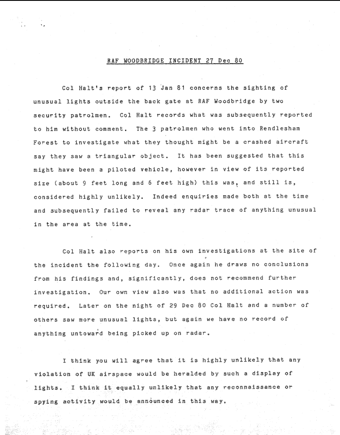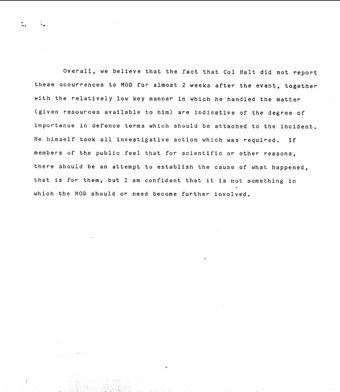Why did the British government not investigate the Rendlesham Forest UFO case in any depth?
Official papers reveal: ‘No additional action was required’
This is the briefing paper prepared for Lord David Trefgarne, a British government defence minister, when he had a private, off-the-record meeting in 1985 October with Lord Peter Hill-Norton, a former Chief of the Defence Staff. It explains why the British government never investigated the Rendlesham Forest case in any depth.
Lord Trefgarne noted that Col Halt in his memo to the MoD did not recommend further investigation. ‘Our own view also was that no additional action was required,’ said Trefgarne. ‘We believe that the fact that Col. Halt did not report these occurrences to MoD for almost two weeks after the event, together with the relatively low-key manner in which he handled the matter, are indicative of the degree of importance in defence terms which should be attached to the incident.’
The two-page paper was among documents found in the Ministry of Defence UFO files released at The National Archives in 2008 May. It is pages 115 and 116 of file DEFE 24/1925. Click on each page below for an enlargement (PDF format).
The meeting arose after correspondence between Lord Hill-Norton and Lord Trefgarne. A letter from Hill-Norton dated 1985 July 26 in which he lists a number of questions he wished to explore can be seen on pages 208–210 in file DEFE 24/1925. Further copies of the same letter can be found on pages 259–261 and 280–282 of file DEFE 31/174.
Knowing of Hill-Norton’s reputation as an avid UFO believer and an outspoken critic of the MoD’s ‘no defence significance’ line, Lord Trefgarne wrote ‘Oh, dear’ at the top of the letter.
Hill-Norton was clearly not persuaded, and returned to the attack in an aggressive correspondence with the MoD in 2001, released in 2007 under the Freedom of Information Act.
In 2005 Simon Weeden, the MoD desk officer who dealt with the Halt memo, revealed to journalist David Clarke the background details of the MoD’s cursory investigation which Hill-Norton was not in a position to know. ‘Those around at the time were not unduly alarmed and did not see this as an incident of great importance,’ he told Clarke. Go to this page on Clarke’s website and search on the name ‘Weeden’.
Weeden gave a longer interview to Clarke on the occasion of the 40th anniversary of the case, reiterating the same points. As he told Clarke:
The MOD priority at the time was to establish if this was something that had an air defence aspect … Should we be concerned about this? Did it come up on radar? Did anyone notice anything odd … bearing in mind that the radars at Neatishead and Watton were manned 24 hours every day by skilled radar operators.
But once we had been through all the basic checks and found there was nothing seen on radar, no obvious explanation, no obvious threat to air defence, we decided no further action was needed.
The full interview can be read here.
© Ian Ridpath. All rights reserved
Content last revised 2021 March

